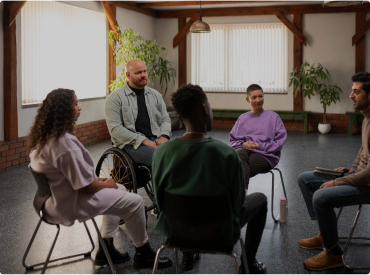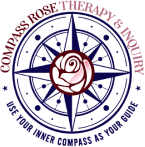Approach
The therapeutic relationship is key to accessing the healing that is possible in the treatment of mental health problems. Our goal is to create a supportive space in which we can teach you how to find safety in the middle of your most challenging struggles by building an improved capacity to track your inner responses and make use of them with more agility and confidence. Whether this looks like learning to sit in a state of discomfort and uncertainty with the aim of building more nuanced control over our responses, or it looks like understanding how to find the language for and communicate our unspoken needs, or whether it looks like understanding the parts of self we have split off and repressed, like anger, shame, and sabotage. These are a few examples of waters we may work in as we explore whether it is an expansive approach that builds inclusion, or one that learns to limit the parts of self-expression that have become damaging, or something else entirely. Healing serious mental health struggles takes time, and it can be a powerful awakening through the pain of our difficulty into an understanding of what psyche is inviting us to know about ourselves that has thus far remained hidden.


Methods
The methods used across therapeutic offerings are often similar, unless we are working in a specific mode like EMDR or other focused group work. Each treatment plan is tailored to your specific case and the goals you identify for how you would like healing to look in your life. We draw from Depth Psychotherapy, Jungian Psychotherapy, Somatic Psychology, Dialectal Behavioral Therapy, Exposure and Response Prevention, I-CBT, Emotion Focused Therapy, EMDR, Attachment Focused Therapy, Psychodynamic Therapy, Family Systems, Structural Family Therapy, Gottman Method, Solution Focused Therapy, Dream Analysis, Experiential Therapy, Expressive Arts therapy, and Inquiry and Mindfulness practices. All therapy work is trauma informed, and careful attention is paid to safety, vulnerability, and privacy for each person participating.
Individual Therapy
“Something we were withholding made us feel weak until we found it was ourselves.” – Robert Frost
One on one therapy is an invitation to strip away layers of unhealed wounds from broken relationships, unhealthy social conditioning, loneliness, and trauma. When we have felt persistently depressed, anxious, angry, or abandoned, our psyche instantly creates coping strategies to shelter the abandoned, split off parts of our self. Many of these coping strategies are maladaptive; such as isolation, addiction, compulsions, avoidance, and chronic dishonesty. The survival strategies we possess often serve us at some point, but eventually become like crutches, and we experience repetitious, damaging responses to our fears, as well as the things we imagine we want for ourselves. We feel a deep sense of loss often experienced as an identity crisis. And yet, there is an opportunity in our being lost, to discover and chart what the self in this current moment needs. As we collaborate, we will create a space for self acceptance, and the changes that are fostered by developing a relationship to your individual insight and intuition. The practice of self knowledge is then accessible and actionable, informing and guiding your choices so that you no longer feel perpetually adrift in the conflicts that arise during the many stages of life development.
“A life truly lived constantly burns away veils of illusion, burns away what is no longer relevant, gradually reveals our essence, until, at last, we are strong enough to stand in our naked truth.” Marion Woodman


Family Therapy
“Feelings of worth can only flourish in an atmosphere where individual differences are appreciated, mistakes are tolerated, communication is open, and rules are flexible.” – Virginia Satir
Each family is its own organic system, an interconnected unit that functions with largely unspoken rules and tendencies it has developed to maintain survival. In early life, events that affect any member of the family ripple like a stone thrown in a pond, eventually touching all other members in the family, though often we deny this. In the process of family therapy, we will identify the problematic relationship tactics that keep family members in cycles of escalation, avoidance, and anxiety. By shedding light on these we can work little by little on the small moments of family life to begin to restructure the larger pattern, organizing more toward healthy communication, safety, authenticity, and interdependence.
Each person’s experience of trust and connection is nuanced by our ethnicity, our family of origin, and the patterns of celebration and conflict that taught us how to be in the world. In doing family systems work, we find an opportunity to confront the patterns that cause us to feel lost, patterns that have reinforced feelings of separateness and eroded trust. We will identify what needs to be restructured and find approaches that rebuild trust and interdependence, leaving behind the frustrations of not being able to reach those we care about most deeply.
“Connection means that we give our kids our attention, that we respect them enough to listen to them, that we value their contribution to problem solving, and that we communicate to them that we’re on their side – whether we like the way they are acting or not.” – Daniel J. Siegel
Couples Therapy
“The heart withers if it does not answer another heart.” -Pearl Buck
Intimate relationship shapes our lives at a core level. Beyond the romantic yearning for partnership, the work of being attentive to each other’s shifting aspirations and conflicts challenges even the most committed in partnership. When people come together and commit to the practice of loving one another without narcissism, deep layers of difficulty can emerge. In addition, life’s transitions can present hurdles that feel perilous for partners to overcome such as: the birth of children, caring for parents, career aspirations and failures, merging families, coping with illness, or trying to keep intimacy alive while navigating survival.
In couples therapy, we focus on remaining attuned to the balance between shared emotional responsiveness and individual inner work. We will learn how to identify and communicate difficult feelings safely, as well as identifying ruptures in each partner’s relationship to them self, and how those impact the capacity for togetherness. We will pay close attention to how to fight and repair effectively, while exploring the ways commitment in sexuality can be an opportunity to express truth, vulnerability and play.
Relationships are not equations, the unique soul of each person can be ignited through the mutual healing of conflicts if we stay close the movement and dance that arise as our intimate relationships face the initiatory conflicts that crop up throughout life. In couples therapy, we take into close consideration the background and ethnicity of each partner in order to increase understanding of beliefs and determine strategies for compromise and collaboration that honor difference even within the union we hold so dear.
Our goal is to create a safe space for partners to practice the skills necessary to take conflicts from escalation, shutdown, and rupture, and navigate toward unity using approaches that rebuild trust and maintain open hearted listening as a crucial form of responsiveness.
“Erotic intimacy is the revelation of our memories, wishes, fears, expectations, and struggles within a sexual relationship. When our innermost desires are revealed, and are met by our loved one with acceptance and validation, the shame dissolves. It is an experience of profound empowerment and self-affirmation for the heart, body, and soul. When we can be present for both love and sex, we transcend the battleground of Puritanism and hedonism.” – Esther Perel


Adolescent Therapy: (ages 13-18)
“Youth is the emergence of spirit within the psyche.” – James Hillman
The stressors on teens are unprecedented in our times given the access to mass amounts of information they have during this critical period of both identity and sexual development. Changing expectations, heightened sensitivity, anxiety, and social pressure filter through a complex landscape of influence online, at school, and at home. Teens need therapeutic support that understands the intersection of these factors and offers them ways to look closely at their struggles, while still feeling creative as they find their interests and voice.
The difficulty in adolescence often stems from the polarities of this developmental period, in which the child self begins to dissolve, and the adult self is still becoming. This complex dynamic is often the reason teens seem eager to contemplate death, then the next moment are expressing their imagined ideas of who they want to become. This is a normal struggle, yet is often ignored or pathologized as teens begin acting out in unfamiliar ways, pushing against authority in an effort to experiment with autonomy and individuality. Additionally, after the isolation that was created during the pandemic, teens have an even greater need to develop social awareness and practice the kinds of engagement that fulfill their need to be seen and heard, even in the multiple expressions and parts of themselves they are experimenting with. We have found that adolescents respond best to therapy that encourages imagination and self expression.
Whether your teen has a history of crisis, has been in residential treatment, or simply needs extra support, we will build the trust necessary to help them locate their inner guidance and build their unique identity shaped by integrity, courage, and an investment in their self discoveries.
“If youth is the season of hope, it is often so only in the sense that our elders are hopeful about us; for no age is so apt as youth to think its emotions, partings, and resolves are the last of their kind.” – George Elliot
EMDR / Trauma Therapy
“The inner sanctuary to which the beleaguered ego repairs in times of crisis is also a world that opens onto transpersonal energies.”
― Donald Kalsched
Trauma occurs as a result of overwhelming, painful events our nervous system experiences as a threat, in which we feel completely out of control. Both single event traumas like car accidents, and repeated smaller traumatic experiences like physical fights with a sibling can register as trauma. When our body registers an experience as a trauma, our brain immediately adapts for survival, repressing the overwhelming events, and reinforcing survival strategies that typically become maladaptive over time. Experiencing trauma, including in early childhood, is very common. If one looks at studies on adverse childhood experiences, referred to as ACEs, there is direct correlation between our adverse experiences and our mental and physical health. Trauma can be a result of substance abuse in the household, neglect, physical, sexual, or emotional abuse, divorce, death, having incarcerated family members, or a parent who has a mental illness. Trauma can also result from group experiences like public shootings, plane crashes, religious cults, systemized racism, organized expressions of hate, and war. First responders and veterans are also often carriers of traumatic experience.

EMDR is an evidence based, gold standard therapy for the treatment of trauma. This means it has been well researched and is currently endorsed internationally as an effective method to relieve recurring, painful traumatic responses like nightmares, feeling triggered into fear and anxiety by seemingly small encounters, feeling easily tearful, or angry, or responding to difficult experiences with alcohol, drugs, and other forms of self sabotage.
EMDR is an eight step process that maps a traumatic event held in the neural circuits according to its relationship with currently held beliefs, behaviors, and emotional states. Through the eye movement desensitization process that includes bi lateral stimulation of the brain hemispheres, memories become less intense in their hold on our emotions and senses. As the old patterns of feelings and beliefs resolve, freedom from painful triggers is often the result.
EMDR can focus on a single event, or can be done to process a series of difficult events. While some memories resolve quite quickly, others can take a couple of months or longer to loosen their grip. This work can be done on its own, as well as in conjunction with talk therapy. This method helps reorganize cognitive understanding, while attuning to the places in our somatic or body memory system that are holding on for protection. If we consider the wide impacts of trauma on our culture, we can begin to understand the amount of unprocessed pain that is informing the choices of many in our circles, near and far. The impact of that pain is profound and a source of the mental illness we confront in far too many that we care about. Working with a caring therapy provider can create the safe space needed to process injuries to the self, and to experience the empowerment that awakens as we shed beliefs that were the inaccurate constructions designed to insulate us from both our pain, and our power. We are experienced in doing EMDR with adolescents and adults from a variety of cultural and social backgrounds.
“Pain and suffering are a kind of currency passed from hand to hand until they reach someone who receives them but does not pass them on.” – Simone Weil

Groups and Retreats
Group therapy provides a safe environment to process our struggles and wins within the context of peer support, creating a real time practice of vulnerability and relationship restructuring. It then becomes easier to take strategies for resolving conflicts and repairing difficulty into our immediate personal circle because we are well practiced at responding and supporting one another in real time.
Groups are offered throughout the year on a variety of topics, and for varied demographics. To be informed about upcoming group work in person or online join our email list here. We limit emails to relevant topics and will never share your information.
Retreats are offered bi annually, and often work in an intensive fashion to create experiential healing. More information will be available soon. Join our email list below to have your finger on the pulse of our group and retreat offerings. We never share your information for commercial or other purposes.
Graduate & Post Graduate Supervision
Individual and group supervision are opportunities to learn from a professional in the field who has been managing the multifaceted elements of being a mental health professional, and can guide you in learning how to provide the best help possible for clients, while maintaining the clinical, ethical, and legal requirements required for independent licensure.
Who we are determines the depth we are capable of bringing to the clients we serve. We must know and understand our own wounds, prejudices, and biases, in order to create the trust and safety so crucial for helping our clients’ recovery. Supervision provides an opportunity to understand your emotions and triggers as a therapist, enabling you to work with clients with depth, non judgement, and compassion. We will discuss assessment and diagnosis, treatment planning and collaborative care, while building your capacity to navigate cases with confidence.

